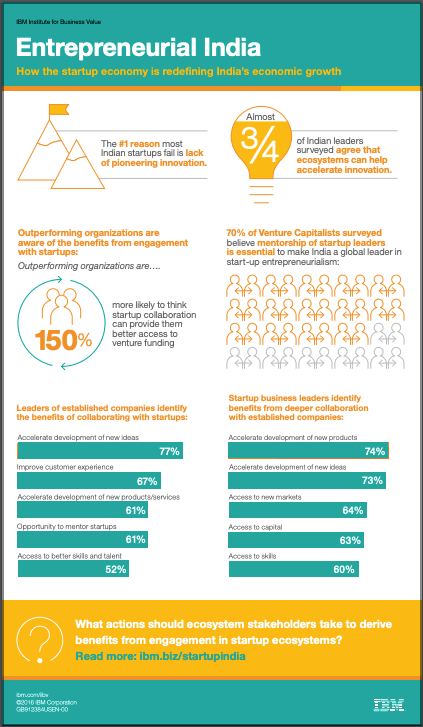Startup failure is common — in fact, nine out of 10 startups in India fail in the first five years. But the good news is, you can use the startup tips below to avoid this fate.
If things are not failing, you are not innovating enough. – Elon Musk, CEO of SpaceX and Tesla Motors
Every entrepreneur — every human for that matter — knows about failure. We make mistakes, yet we succeed a few times, too. As you dream of building the next big thing on the planet, understand that two out of 10 new businesses fail in the first year of operations. By the same token, 10 % succeed.
Read on to learn from startup failures to make sure your new venture is among the 10%.
Top 7 reasons startups fail (and how to avoid these pitfalls)
Let’s examine some of the key reasons startups fail, along with practical startup tips and solutions that can help you avoid this.
1. Lack of market demand
More than 40% of companies fail because they created their product or service without considering the market context. In some cases, the market was not yet mature, or it was over-crowded with companies solving the same problem in the same way.
Either your product doesn’t fill a need in the market or other companies are already meeting it.
Experts believe this happens when startups launch without a market analysis and/or deep testing.
How can startups avoid this?
- Do a thorough market research to gain insight into the market size, statistical segments, and so forth.
- Find what type of current problems your audience has in order to determine market demand.
- Fill a gap in the market by offering a new solution, whether through new technology, service, or disruptive pricing.
Bottom line: Look for any gaps in the market to use as unique selling propositions.
2. Lack of innovation
According to a 2017 study conducted by IBM, 77% of venture capitalists think that Indian startups lack innovation.
Globally too, the business landscape is littered with cautionary tales of huge companies that failed due to lack of innovation, such as Kodak, Nokia, BlackBerry and Sony Walkman, to name a few.
Unwillingness to innovate puts any company at risk of failure, but this is even truer for startups that are struggling to make a mark in a crowded marketplace.

How can startups avoid this?
- Constantly research in order to understand the (local) marketplace better.
- Hire expert technical workers and create a culture of innovation.
- Think about the long-term sustenance of the idea; remember, you are selling a realistic plan and not just an idea.
- Consider introducing new software and technologies into your business to make processes more efficient and productive.
Bottom line: Refusing to evolve with the market can lead to disaster in the current scenario.
3. Too little money
There are hundreds of startup ideas floating around. But to turn ideas into reality requires money.
Lack of funding is one of the biggest reasons why startups fail.
Studies have shown that insufficient cash is a roadblock that leads many startups to shut shops. This is especially true for startups that receive seed funding but cannot raise follow-on funds leading to startup failure.
How can startups avoid this?
- Startups must have sustainable business and revenue models.
- Focus on revenue and profit as much as products/services from an early stage.
- Do your research and check local government agencies for startup funding or emergency grants.
- Look at streamlining expenses, lowering valuations, and asking for less.
- Funds must be spent judiciously.
Bottom line: Look for grants, streamlining expenses, lowering valuations and asking for less.
Related: Where to look for startup funding in India
4. Leadership gaps
Most startups are driven by the vision of its founders and core team members.
Often startup founders have a good idea but don’t have the knowledge or the expertise to lead a team to success.

This is another common reason why startups fail. Leadership gaps can include a number of things — from internal conflict and poor strategy, to general lack of vision. If leaders cannot provide a strong foundation, startup failure is all but inevitable.
How can startups avoid this?
- Become a learning organization through continuous improvement.
- Make decisions slowly by consensus.
- Develop exceptional people and teams that follow your company’s philosophy.
- Standardize tasks and processes to create consistency.
- Respect your extended network of partners and suppliers by helping them improve.
- Create a culture of transparency and openness.
- Find a mentor to help you build leadership skills.
Bottom line: With knowledge, cooperation and behavior modeling, leaders can inspire team members to grow and excel.
5. Trying to grow too quickly
Why many startups fail is because they want to expand too early and too fast. The term often called ‘premature scaling’ in business can be defined as spending money on growing the business before nailing the product-market fit.
In their enthusiasm to grow, startup founders often put the cart before the proverbial horse.
They hire more sales personnel and other staff than required, expand faster in their market than is wise, and spend too much on marketing campaigns. A study by Startup Genome Project reports that 70% of startups scale up too early, and as a result, fail.
This should not be confused with real scaling and growth. As a serial entrepreneur and investor Michael A. Jackson says, “in case of premature scaling, the more a company grows, the further away from profitability it becomes.”
How can startups avoid this?
- Don’t hurry — there are no shortcuts to success.
- Focus on who your primary customers are and what problem they want you to solve.
- Create an in-demand product that serves a large enough market for your startup to grow.
Bottom line: If you want to build a successful startup, don’t scale up before you’re ready to.
6. Not investing in the right team
“Talent wins games, but teamwork and intelligence win championships.” This famous saying by basketball legend Michael Jordan rightly highlights the importance of hiring people who can work together as an effective team.
Few businesses survive and grow as a one-person army. With a good team, you can meet any challenge or pitfall and thrive in each situation.
A primary reason for startup failure is that startups often have little money and cannot afford to hire experts or experienced employees who come at a high price.

How can startups avoid this?
- Plan the hiring process with utmost care.
- Invest in a team of experts with diverse backgrounds — such as business, technology, marketing, and finance. Each will bring different perspectives to your business.
- Be open to alternative working methods such as work on freelance-basis or a project basis model with expert professionals.
Bottom line: Hire better people by giving the candidates a real issue to solve.
7. Business model failure
A good product, an impressive website, and a huge advertising budget may not be enough to attract customers and business. All of this should be complemented with the right business model, be it:
- Direct sales
- Franchise
- Subscription
- Platform business model
The right business model minimizes startup failure rates.
How can startups avoid this?
- Spend time on your value proposition, in other words, how your business can be valuable to your customers.
- Do not ignore external threats such as competition. Evaluate their business models and learn from them.
- Always seek expert opinions/advice, even if you have to pay for it.
Bottom line: To be successful, research and design a business model that works not only for your customers but also for your company.
These startup tips can help you avoid startup failure
Startups are based on novel ideas. If that idea is in step with market demands, your business can work wonders.
These startup tips can guide you to do your groundwork, invest wisely in your team and build your dream product, step by step. The more you research and establish a proactive environment, the more likely you can avoid startup failure. With the market getting volatile in the post-COVID era, you need to envisage the future and focus on the profitability and viability in the long run. All the best!







